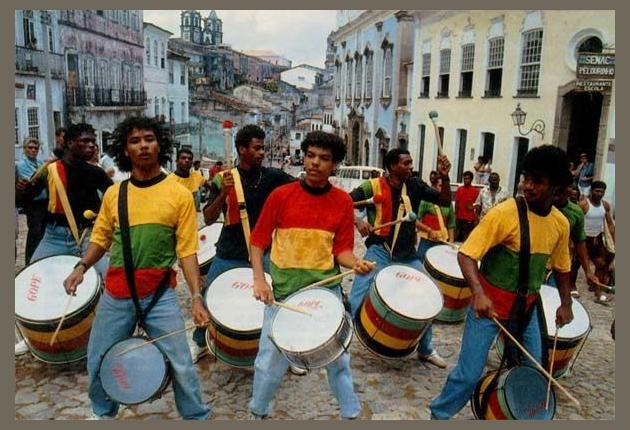 Olodum
Olodum
Olodum: The Pulsating Heart of Bahia
In the vibrant tapestry of Brazil's musical landscape, Olodum stands as a beacon of innovation, activism, and cultural preservation. Originating in the heart of Salvador, Bahia, this renowned band has captivated audiences worldwide with its energetic rhythms, infectious melodies, and socially conscious lyrics.
Origins and Inspiration
Olodum emerged in 1979 as a collective of young artists, percussionists, and dancers who sought to revive the cultural traditions of their African ancestors. Inspired by the Yoruba deity Olodumaré, the band's name signifies the belief in a supreme being who created the universe and all its inhabitants.
Musical Style and Influences
Olodum's music draws heavily on the rich musical heritage of Bahia, blending elements of samba, reggae, and Afro-Brazilian percussion. Their signature sound is characterized by pulsating drums, soaring brass, and a chorus of passionate voices. The band's lyrics often delve into themes of racial pride, social justice, and the celebration of African history and culture.
Faraó Divindade do Egito
One of Olodum's most iconic songs, "Faraó Divindade do Egito," became a global anthem upon its release in 1998. The song celebrates the ancient Egyptian civilization and its pharaohs as symbols of African empowerment and resilience. The soaring chorus and infectious rhythm have made "Faraó Divindade do Egito" a staple of Brazilian music and a source of inspiration for generations.
Challenges and Controversies
Throughout its history, Olodum has faced challenges and controversies. The band's outspoken advocacy for social justice has drawn criticism from some quarters, but it has also earned the respect and admiration of countless others. In 2013, the band's headquarters was vandalized by unknown assailants, an act widely condemned as an attack on Brazilian culture and freedom of expression.
Discography and Members
Olodum has released over 20 albums, showcasing their diverse musical style. Notable releases include:
* "Egito Madagá" (1987)
* "The Rhythms of Bahia" (1990)
* "Olodum" (1996)
* "Axé Bahia" (2000)
* "Samba Reggae" (2008)
Over the years, Olodum has seen numerous members come and go. Notable members include:
* Neguinho do Samba (vocals)
* Mestre Didi (percussion)
* Carlinhos Brown (percussion)
* Viviane Ferreira (vocals)
* Daniela Mercury (vocals)
Legacy and Impact
Olodum's impact on Brazilian music and culture cannot be overstated. The band has inspired countless other artists, helped preserve the traditions of Bahia, and promoted racial equality and social justice. Olodum's music continues to resonate with audiences worldwide, serving as a vibrant testament to the power of art to bridge cultures and transform societies.
In the vibrant tapestry of Brazil's musical landscape, Olodum stands as a beacon of innovation, activism, and cultural preservation. Originating in the heart of Salvador, Bahia, this renowned band has captivated audiences worldwide with its energetic rhythms, infectious melodies, and socially conscious lyrics.
Origins and Inspiration
Olodum emerged in 1979 as a collective of young artists, percussionists, and dancers who sought to revive the cultural traditions of their African ancestors. Inspired by the Yoruba deity Olodumaré, the band's name signifies the belief in a supreme being who created the universe and all its inhabitants.
Musical Style and Influences
Olodum's music draws heavily on the rich musical heritage of Bahia, blending elements of samba, reggae, and Afro-Brazilian percussion. Their signature sound is characterized by pulsating drums, soaring brass, and a chorus of passionate voices. The band's lyrics often delve into themes of racial pride, social justice, and the celebration of African history and culture.
Faraó Divindade do Egito
One of Olodum's most iconic songs, "Faraó Divindade do Egito," became a global anthem upon its release in 1998. The song celebrates the ancient Egyptian civilization and its pharaohs as symbols of African empowerment and resilience. The soaring chorus and infectious rhythm have made "Faraó Divindade do Egito" a staple of Brazilian music and a source of inspiration for generations.
Challenges and Controversies
Throughout its history, Olodum has faced challenges and controversies. The band's outspoken advocacy for social justice has drawn criticism from some quarters, but it has also earned the respect and admiration of countless others. In 2013, the band's headquarters was vandalized by unknown assailants, an act widely condemned as an attack on Brazilian culture and freedom of expression.
Discography and Members
Olodum has released over 20 albums, showcasing their diverse musical style. Notable releases include:
* "Egito Madagá" (1987)
* "The Rhythms of Bahia" (1990)
* "Olodum" (1996)
* "Axé Bahia" (2000)
* "Samba Reggae" (2008)
Over the years, Olodum has seen numerous members come and go. Notable members include:
* Neguinho do Samba (vocals)
* Mestre Didi (percussion)
* Carlinhos Brown (percussion)
* Viviane Ferreira (vocals)
* Daniela Mercury (vocals)
Legacy and Impact
Olodum's impact on Brazilian music and culture cannot be overstated. The band has inspired countless other artists, helped preserve the traditions of Bahia, and promoted racial equality and social justice. Olodum's music continues to resonate with audiences worldwide, serving as a vibrant testament to the power of art to bridge cultures and transform societies.